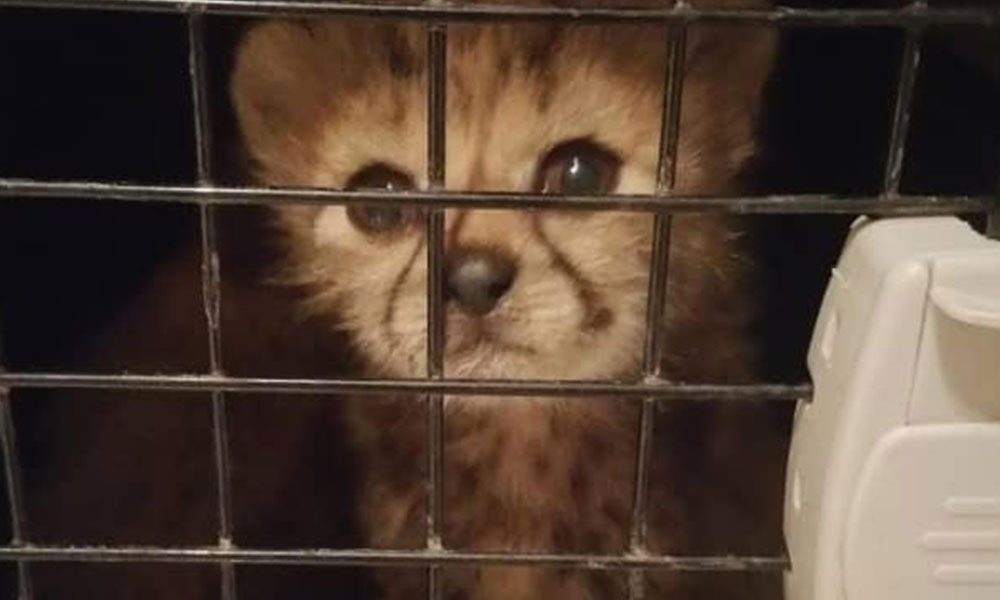Cheetah Conservation Fund Receives Three More Sick Cubs Intercepted from Illegal Pet Trade, Raises Total to 14 at ‘Cheetah Safe House’ in Somaliland
-

- by CCF Staff September 28, 2018
FOR IMMEDIATE RELEASE
HARGEISA, Somaliland (28 September 2018) – Three more cheetah cubs confiscated by Somaliland Police and the Somaliland Ministry of Environment and Rural Development (MOERD) have been placed in the care of Cheetah Conservation Fund (CCF) in Hargeisa. The cubs are approximately three-weeks-old and are extremely malnourished and dehydrated. CCF received the three cubs on 26 September. CCF cheetah caregivers have been providing intensive fluid therapy and a carefully designed diet to all three in the days since. The cubs were destined for the illegal pet trade in the Arabian Peninsula, across the Gulf of Adan.
“We applaud the Somaliland government for increasing pressure on cheetah traffickers and confiscating cubs poached from the wild. But in addition to confiscations, we need to also reduce demand for cheetahs as pets”, said Dr Laurie Marker, Founder and Executive Director of CCF.
Somaliland is the main trafficking route for cheetahs out of East Africa into the Middle East, where demand for pet cheetahs is high. CCF estimates 300 cheetah cubs are smuggled from the Horn of Africa into Yemen each year to be sold into the pet trade. Five out of six cubs poached will die from improper care before ever reaching the coast. Cubs that live long enough to be sold as pets rarely survive longer than two years anyway.
“CCF needs funding to help us raise awareness for the threat of cheetah trafficking and the illegal pet trade. We also need money to build capacity in in the Horn of Africa. We have now 14 cheetahs under the care of a very small team in Hargeisa, and taking care of these animals is costly”, added Dr Marker. “Trafficking is decimating the local wild cheetah populations in Ethiopia, Somalia, and other pockets of East Africa. For these reasons, I implore people to stop taking cheetahs from the wild to become pets”.
Since 2011, CCF has been working with authorities in Somaliland and building partnerships with local and international non-governmental organisations to address the threat of cheetah trafficking. To date, 53 cheetahs have been rescued from the illegal pet trade, either by surrender or confiscation. In 2017, CCF set up its temporary shelter for confiscated animals in Hargeisa. CCF assists the MOERD with confiscations, cheetah care and smuggler prosecutions.
“We truly hope that authorities in countries where cheetahs are popular pets take action to make this practice not only illegal, but socially unacceptable”, said Patricia Tricorache, CCF’s Assistant Director of Illegal Wildlife Trade. “Buyers are willing to pay up to $15,000 USD for a pet cheetah, but would they still be willing if they knew how many cubs died in the process”?
Tricorache is travelling to Russia this week to present CCF cheetah trafficking data at the Convention on International Trade in Endangered Species (CITES) 70th Standing Committee Meeting in Sochi, Russia, 1-5 October 2018. Dr Marker is in New York City this week, where she is presenting the same information to international audiences at events surrounding the annual United Nations General Assembly session.

About CCF
Cheetah Conservation Fund (CCF) is the global leader in the research and conservation of cheetahs. Founded in Namibia in 1990, CCF maintains a research programme studying the biology, ecology and genetics of the cheetah and operates the only fully-equipped genetics laboratory at an in-situ conservation site in Africa. CCF has created a set of integrated programmes based on this research that address threats to the cheetah and its entire ecosystem, including human populations. CCF operates from the principal that only by securing the future of the communities that live alongside the cheetah can you secure a future for the species.
MEDIA CONTACTS:
Susan Yannetti
Mobile/WhatsApp: +1-202-716-7756
[email protected]
Dr Laurie Marker
Mobile voice: +1-571-275-2426
WhatsApp: +264 811 247887
[email protected]
Patricia Tricorache
Mobile/WhatsApp: +1-305-766-8229
[email protected]
Related Reading

